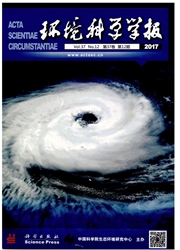

 中文摘要:
中文摘要:
焦化废水水质的复杂性及对环境、生态影响的不确定性制约了处理水质的全面达标,且可能对后续水体造成危害.为了解焦化废水的基本物化性质、环境学特性及生物学特性,采用离子色谱、ICP/MS、GC/MS等分析手段研究了广东韶关焦化厂废水的COD、BOD、色度、氨氮、主要阴阳离子、金属成分及有机物组成等,评价了该焦化废水组分的可处理性及环境危害性,分析了焦化废水生物处理过程及可能存在的惰性有机污染物.结果表明,焦化废水构成环境危害的主要组分有COD、氨氮,挥发酚、氰化物、硫化物、氟化物及油份等,重点是有机污染物;第一类污染物在原水及外排水中的浓度是安全的;焦化废水中以酚为代表的有机物及多环、杂环化合物在水中广泛存在,经处理后仍有间甲酚、长链烷烃、苯系物、酯类、醇类、卤代烃及胺类等进入环境;造成焦化废水处理效率不高的原因是各组分之间的不协调而难以维持生物系统的正常ATP酶活,富氮缺磷,氨的生物毒害,毒性有机物对生物的抑制,Na^+/K^+比例失衡等.因此,有毒/难降解焦化废水的处理技术须综合考虑污染物的组成、合理的工艺及排放水的生态安全性.
 英文摘要:
英文摘要:
The complicated nature of coking wastewater is an obstruction to satisfying the all-around Water Quality Standard and is harmful to the environment. COD, BOD, color, ammonia nitrogen, volatile phenol, cyanide, anions, cations, heavy metals and organic compounds of a coke plant wastewater were analyzed by ion chromatography, ICP/MS, GC/MS and other regulatory methods of analysis. The constituents were evaluated from environmental and biological perspectives. COD, ammonia nitrogen, volatile phenol, cyanide, sulphide, fluoride and oil are harmful, especially the organics. Phenols, polycyclic aromatic hydrocarbons and heterocyclic compounds all exist in the coking wastewater and m-cresol, long chain alkanes, benzene series compounds, esters, alcohols, halogenated hydrocarbons, and amines could be detected in the outflow from the filter tank. The accumulated heavy metals like Cr, Cd, Hg, As, Ni and Pb are safe to the water environment. The Na^+:K^+ ratio did not match the optimum value of metabolism, so K^ + and PO4^3 - must be provided to maintain ATPase activity. The treatment of toxic compounds which are difficult to biodegrade should consider the pollutants present, appropriate technologies and ecological security.
 同期刊论文项目
同期刊论文项目
 同项目期刊论文
同项目期刊论文
 期刊信息
期刊信息
